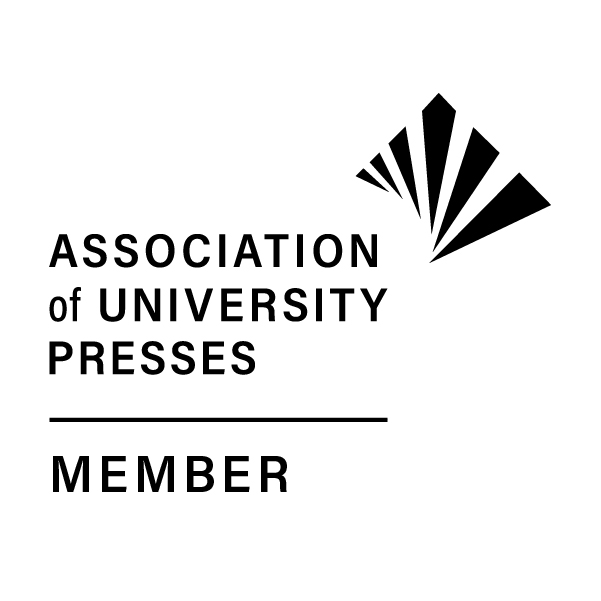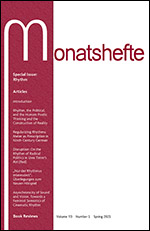|


|

Subscribe
Read the Journal Online
Submission Guidelines
Editorial Board
Receive Email Updates
Advertise in Monatshefte
Indexes/Abstracts
Current Issue TOC
Back Issues TOC
Monatshefte 2022 Subscription Rates
Institutions:
print & online $271
online only $233
Individuals:
print & online $103
online only $86
Non U.S. Postage (no postage charges for online-only subscriptions)
Airmail: add $40/yr.
Canadian Subscribers: add 5% GST. |
Monatshefte
Volume 101, Number 3, Fall 2009 Table of Contents
In memoriam Reinhold Grimm (1931–2009)
(RE)READINGS—NEW READINGS / (WIEDER)GELESEN—NEU GELESEN
Peter Szondi, Theorie des modernen Dramas
Klaus Berghahn
Peter Szondi, Theorie des modernen Dramas (1956)
Peter Höyng
Peter Szondi’s Theorie des modernen Dramas (1956/63)
From Absolute Drama to Absolute Theory
Articles
Reinhold Grimm
Versuch, kubistische Lyrik zu übertragen: Vier Gedichte von August Stramm auf Englisch
Abstract:
This article is the final document of the late Reinhold Grimm’s intense and fruitful engagement within the field of literary translation. Grimm takes on the particularly difficult task of translating expressionist poems by August Stramm. Since simplistic attempts such as ‘literal’ or paraphrastic translations necessarily fail, Grimm transfers the structural principle of the source texts to the target texts. In analogy with the arts he names this principle cubist, thus trying to master a double task, i.e., to translate a German verbal rendering of cubism into English. The results of this endeavor are twofold: in addition to challenging translations of four challenging poems by August Stramm, Grimm offers critical reflections on every single decision that was made during the process of translation, thus providing the reader with transparent translations of opaque texts. (HA; in German)
J. M. van der Laan
Johann Gottfried Herder on War and Peace
Abstract:
In the Briefe zu Beförderung der Humanität, J. G. Herder engages both Saint-Pierre and Kant in the eighteenth-century debate about perpetual peace, but comes to his own characteristic conclusions. With the last letters of the last collection, Herder analyzes past and present rationalizations for war, finds them hypocritical and self-serving, and proposes a paradigm for peace suggested by a Native American institution instead. An investigation of his formula for peace reveals as well a clear and fundamental link to his definition of Humanität, the concept at the center of all his thought. Although unable to assert a utopian solution for eternal peace, he nevertheless challenges his readers then and now to temper realism with idealism, skepticism with hope. (JMvdL)
Sylvain Guarda
Büchners Lenz: Eine kindliche Pastorale im Muttergeiste Rousseaus
Abstract:
The essay revisits Georg Büchner’s novella Lenz (1835) through the prism of eighteenth-century childhood ideologies. The novella purportedly depicts a period of aimless wanderings in the life of the mentally ill Sturm und Drang writer, J.M.R. Lenz (1751–92). An analysis of the recurrent child motif and of the philosophical problem of “stillness” versus “striving,” however, reveals a surprising indebtedness to Rousseau’s yearning for inward peace rather than J.M.R. Lenz’s altruistic ideal of constant striving and moral perfectibility. The study of the main character’s repeated regressions into childhood leads to a reevaluation. The novella can no longer be considered as a precise literary depiction of a schizophrenic case or a symbolic rebellion against the almighty father as generally argued. Büchner’s Lenz, in its poetic blending of Lenz and Rousseau, presents a feverishly vivid portrait of the author’s double life, a constant balancing act between political activism (progression) and poetic reflection on Mother Earth (regression). (SG; in German)
Derek Hillard
Violence, Ritual, and Community: On Sacrifice in Keller’s Romeo und Julia auf dem Dorfe and Storm’s Der Schimmelreiter
Abstract:
This study explores Keller’s Romeo und Julia and Storm’s Der Schimmelreiter to show the persistence of myth in German realism. Although the ciphers for myth differ significantly in the two novellas, they have a common source—the discourse of sacrifice. In both texts, sacrifice delimits violence, generates ritual in the social sphere, and demonstrates how community is engendered. The key difference is that in Romeo und Julia the sacrificial concern is with the production of an enigmatic space that functions aesthetically, as it relates to play and childhood. In the case of Der Schimmelreiter, by contrast, the concern is with instrumentalizing the sacrificial object with the effect that it becomes society’s mythical founder and shield. The texts share motifs of entombment, crypts, specters, secrets, and uncanny spaces, motifs that are at once the repression and disclosure of myth. (DH)
Russell T. Harrison
The Social(ist) Construction of Art in Thomas Bernhard’s Alte Meister
Abstract:
This essay advances the thesis that Bernhard’s late novel, Alte Meister (1985), put in its historical and political context reveals a consistent, if syncretic, leftoriented political Weltanschauung. It gathers together political strands from Anarchism, humanist Marxism, and a crude materialism. These ideas play out in a critique of the traditional conception and reception of Western High Art. Central to the novel’s view of such art is not only that artistic value is socially constructed but that there is a classist element to its reception. The latter point is implicitly critiqued in the cross- class relationship between the Saaldiener, Irrsigler and the haut bourgeois, Reger, that the novel somewhat apotheosizes. The essay also suggests that the destruction of the aura of the Western High Artwork is at the same time related to the Anarchist critique of the traditional top-down political power structure of western political theory. (RTH)
Book Reviews
Baisch, Martin und Beatrice Trînca, Hrsg., Der Tod der Nachtigall. Liebe als Selbstreflexivität von Kunst (Albrecht Classen)
Beetz, Manfred, Jörn Garber und Heinz Thoma, Hrsg., Physis und Norm. Neue Perspektiven der Anthropologie im 18. Jahrhundert (Nicole Calian)
Berg, Gunhild, Erzählte Menschenkenntnis. Moralische Erzählungen und Verhaltensschriften der deutschsprachigen Spätaufklärung (Brian McInnis)
Coxon, Sebastian, Laughter and Narrative in the Later Middle Ages: German Comic Tales 1350–1525 (Thomas Kerth)
Di Bartolo, Julia, Selbstbestimmtes Leben um 1800. Sophie Mereau, Johanna Schopenhauer und Henriette von Egloffstein in Weimar und Jena (Barbara Becker-Cantarino)
Fordham, Kim, Trials and Tribunals in the Dramas of Heinrich von Kleist (Erika Berroth)
Fronius, Helen, Women and Literature in the Goethe Era 1770–1820: Determined Dilettantes (Ruth P. Dawson)
Gerstenberger, Katharina, Writing the New Berlin: The German Capital in Post-Wall Literature (Stephen Brockmann)
Godel, Rainer, Vorurteil—Anthropologie—Literatur. Der Vorurteilsdiskurs als Modus der Selbstaufklärung im 18. Jahrhundert (John H. Zammito)
Goozé, Marjanne, ed., Challenging Separate Spheres: Female Bildung in Eighteenth- and Nineteenth- Century Germany (Ruth P. Dawson)
Grimm, Gunter, E. und Christian Schärf, Hrsg., Schriftsteller-Inszenierungen (Wolfgang Emmerich)
Hellwig, Marion, Alles ist gut. Untersuchungen zur Geschichte einer Theodizee-Formel im 18. Jahrhundert in Deutschland, England und Frankreich (Wulf Koepke)
Hlukhovych, Adrianna, “. . . wie ein dunkler sprung durch eine helle tasse . . .” Rainer Maria Rilkes Poetik des Blinden. Eine ukrainische Spur (Peter Zusi)
Höfler, Günther A. und Gerhard Melzer, Hrsg., Marlene Streeruwitz (Helga W. Kraft)
Konzett, Matthias Piccolruaz and Margarete Lamb-Faffelberger, eds., Elfriede Jelinek: Writing Woman, Nation, and Identity. A Critical Anthology (Jack Davis)
Kraft, Helga und Therese Hörnigk, Hrsg., Eine Welt aus Sprache. Zum Werk von Gerlind Reinshagen. Eine kritische Anthologie (Dagmar Jaeger)
Mosbach, Bettina, Figurationen der Katastrophe. Ästhetische Verfahren in W.G. Sebalds Die Ringe des Saturn und Austerlitz (Markus Zisselsberger)
Saul, Nicholas, Gypsies and Orientalism in German Literature and Anthropology of the Long Nineteenth Century (Roger Russi)
Schellenberger-Diederich, Erika, Geopoetik. Studien zur Metaphorik des Gesteins in der Lyrik von Hölderlin bis Celan (Alexander Honold)
Solms, Wilhelm, Zigeunerbilder. Ein dunkles Kapitel der deutschen Literaturgeschichte. Von der frühen Neuzeit bis zur Romantik (Iulia-Karin Patrut)
Sotiropoulos, Carol Strauss, Early Feminists and the Education Debates: England, France, Germany 1760–1810 (Pia Schmid)
Stock, Angela and Cornelia Stott, eds., Representing the Unimaginable: Narratives of Disaster (Christoph Weber)
Warner, Ansgar, “Kampf gegen Gespenster”. Die Radio-Essays Wolfgang Koeppens und Arno Schmidts im Nachtprogramm des Süddeutschen Rundfunks als kritisches Gedächtnismedium (Justus Fetscher)
Wende, Waltraud, Hrsg., Wie die Welt lacht. Lachkulturen im Vergleich (Jürgen Macha)
Williams, John Alexander, Turning to Nature in Germany: Hiking, Nudism, and Conservation, 1900–1940 (Carl Niekerk)
Yoo, Hyun-Joo, Text—Hypertext—Hypermedia. Ästhetische Möglichkeiten der digitalen Literatur mittels Intertextualität, Interaktivität und Intermedialität (Peter Krapp)
|


